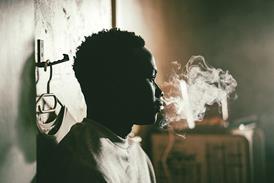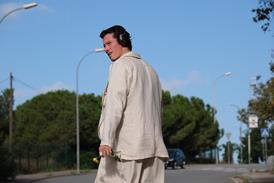The director of the Birds Eye View Film Festival, which kicked off in London this week, shares some of the highlights of this year’s edition and her views on female presence in the film industry.
Rachel Millward got her introduction to the film industry when she worked as a researcher for independent production companies. Prompted by the statistic that women make up just 7% of filmmakers, Millward co-founded the Birds Eye View organisation in 2002 as a way to celebrate female filmmakers through short films.
The Birds Eye View Film Festival followed in 2005, and has been showcasing international women filmmakers ever since. Since 2008, the festival has included a mixture of masterclasses, new films and annual retrospectives. This year’s Birds Eye View festival, which opened on Tuesday, runs through March 17 at London’s BFI Southbank.
This year is the 100th anniversary of International Women’s Day, which kicks off the festival. Is there anything special about this year’s festival that ties in with that?
We’ll focus on Margarethe von Trotta and two of her films which focus on pioneering, revolutionary, groundbreaking women in history. One of them is Rosa Luxemburg, and the other film called Vision is about Hildegard von Bingen. And there is the Equals Campaign that’s happening this year for the first time to highlight the fact that there still isn’t equality between women and men.
But I don’t know whether [this year’s programme] is actually specifically for International Women’s Day, because the whole programme is celebrating women making films and always has been. The films are all by women and not necessarily about women. It’s about having women’s creative vision, whatever they want to say. Our retrospective is “Bloody Women from Gothic to Horror,” so that’s not exactly particularly tied to Women’s Day, but it’s important to celebrate the early contribution to a genre which ended up being hugely male-dominated.
What are you most excited about this year?
Susanne Bier’s In A Better World. It just won the Oscar and it won the Golden Globe before that, but regardless of that, it’s just amazing. It’s a really knockout, brilliant film. It was so clear when we saw it, I just thought, “Oh dear, that is the kind of film that we desperately want to show.” So it’s a real thrill when you’re able to show a film like that.
We’ve also got Tiny Furniture by Lena Dunham, which stars herself. She’s a graduate who’s got that quarter-life crisis and doesn’t know what she’s going to do. It’s this very deadpan, mumblecore sort of movie. It’s incredibly vulnerable on the part of the filmmaker; she’s put herself out there and she’s having a laugh, but it’s an incredibly exposing thing to do. Clearly she is an exciting new voice.
There’s another film called The Imperialists Are Still Alive by Zeina Durra, which is such a fascinating film. I just haven’t seen anything like it before. It’s about a second-generation Arab community in New York, and it’s very much a post-9/11 world. I honestly just had never had this culture shown to me in this way, so I think that is exciting to be showcasing such a new voice like that.
And then there’s Grown Up Movie Star by Adriana Maggs, which is a very well-made, emotionally engaging drama about the burgeoning sexuality of a teenage girl. There’s brilliant acting in there, some brilliant family relationships.
The Birds Eye View Film Festival has been dealing with some funding issues, and you’ve said that the festival “faces critical times.” What’s the current status?
We were one of eight national festivals who got the [UK Film Council’s] Festivals Fund money for the last three years. This year is the last year of that fund. The other fund which we’ve been getting support from the Film Council is the diversity grant-in-aid money. They’ve been investing in the festival for a few years, and that was really kind of radical. That part is getting cut.
There’s a huge amount unknown in the film industry at the moment, as we all know. We don’t know yet what the specifics are. And there is no indication at the moment that there will be a Festivals Fund once [government support of films] moves to the BFI. But we do know that there is a lot less money than there was before, and being realistic, there’s no guarantee. Everybody’s fighting for half the money, so it’s very, very difficult. The public funds we’ve been getting will come to an end after this year. I’m fundraising now for 2012 and beyond, which will be a mixture of corporate, individual support, different funding bodies… these are different avenues that I’m pursuing.
So what are your thoughts on the future of the festival?
Every arts organisation is having to question themselves really carefully at the moment and think about whether it’s the time to end. I think the assessment of the situation, really, is that we absolutely need to keep doing what we’re doing. Since the recession, the vast majority of the people who’ve left the film industry have been women. You’ll hear some people say, “The recession is not that bad, it’s quite good in a way. It shakes everything up and talent will out.” That’s very dangerous because the talent that will out will be more likely to be the white male talent.
Unless you keep an eye on the issue of diversity and equality in a time like that, you’re really in danger of losing it. We feel very important, very pertinent, very relevant in terms of that, so we don’t really have a doubt that we need to be doing what we’re doing. It’s going to be a tricky time ahead, but there will be a way through because there’s enough energy behind it.
You’ve said in the past that just 7% of filmmakers are women. Is this still true?
If anything, it’s getting worse in all the different roles. It’s really low, and writing is really low as well. Apparently they often get women in to rewrite bits of scripts that men have written, because the women’s dialogue is so bad in it. They don’t really get credit for that. People ask me, is there such a thing as a woman’s perspective in cinema? I don’t know, every woman’s different. If you write a film, it’s going to be about totally different stuff from me… but it would be pretty unlikely if you didn’t include any sort of rounded female characters. You know women pretty well, because you are one. That’s what happens.
It’s always really interesting when you see the festival as a whole and you look at those different films, and there are always some really fascinating, strong, interesting women characters who are multi-dimensional and complicated. I’m less tolerant of films where there’s just an all-male cast and there’s one woman who’s a sidekick, and I don’t even know what she’s doing or what her motivations are. What’s really interesting to me is how used to that audiences get. You lose the expectation that you go to the cinema and you see people who you relate to. You never see any middle-aged women on the screen. I’ve seen so many middle-aged men with all different kinds of boring looks… it’s so funny how you just are used to it. It’s not like the rest of life. A film should reflect and inform life.
Some women in the industry want to emphasise their gender, whereas others prefer to be seen as filmmakers rather than specifically as women filmmakers. What’s your take on that?
If I was a filmmaker, I’d just be a filmmaker. My job is to celebrate women filmmakers. I really wouldn’t want to say to any woman filmmaker, “No, you really have to talk about being a woman all the time.” What I want to do is give them a platform to do whatever the hell they want to do creatively. What I do is to shed the spotlight on a radical imbalance, and to celebrate loads of women who are amazing and who are different and who are diverse.
I think it’s very important for women who are trying to make money in the industry that the only time women directors get called is when there’s a specific film with really female content, rather than just, “Who’s really good, and who’s out there?” And we need that, don’t we? We just need women filmmakers to be considered alongside male filmmakers and not to be only considered when the woman bit is important. So I totally understand why the tag is irritating if you’re just trying to work like that and get on with it. But I at the same time obviously think that people like me and things like Birds Eye View need to be doing what they’re doing. Otherwise we’re not going to get any change.
How would you boil down the message that you hope to send out with this festival?
I just think that it’s a celebration of women’s creative vision in cinema, in all its diversity. It’s that, really. It’s definitely a celebration. And it’s a platform for women to say what they want to say and to have their own vision and for us to enjoy that and just to realize that that should be more integrated into culture than it is. So it’s just to celebrate some very talented women and enjoy their vision.






















No comments yet